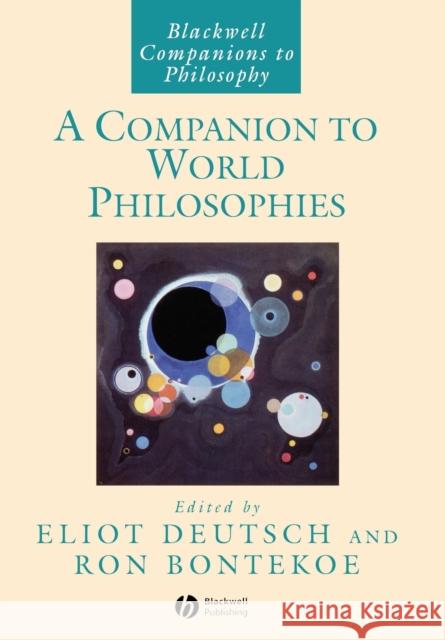A Companion to World Philosophies » książka



A Companion to World Philosophies
ISBN-13: 9780631213277 / Angielski / Miękka / 1991
A Companion to World Philosophies
ISBN-13: 9780631213277 / Angielski / Miękka / 1991
(netto: 199,84 VAT: 5%)
Najniższa cena z 30 dni: 208,54
ok. 30 dni roboczych.
Darmowa dostawa!
This outstanding volume offers students, teachers and general readers a complete introductory survey of the major non-western philosophical traditions.
Introduction.
Guide to Pronunciation.
Part I: Historical Background:.
1. Chinese Philosophy: Tu Weiming (Harvard University).
2. A History of Indian Philosophy: J. N. Mohanty (Temple University).
3. Classical Polynesian Thinking: John Charlot (University of Hawaii at Manoa).
4. A Survey of Buddhist Thought: Ninian Smart (University of California at Santa Barbara).
5. Islamic Philosophy: Tamara Albertini (University of Hawaii at Manoa).
Part II: The Chinese Tradition:.
6. Ideas of the Good in Chinese Philosophy: Shun Kwong–Loi (University of California at Berkeley).
7. The Chinese Conception of Selfhood: Roger T. Ames (University of Hawaii at Manoa).
8. Human Beings and Nature in Traditional Chinese Thought: P. J. Ivanhoe (Stanford University).
9. Causation in Chinese Thought: Carine Defoort (Catholic University of Leuven).
10. Chinese Social–Political Ideas: Henry Rosemont Jr. (St. Mary′s College).
11. Reason and Principle in Chinese Philosophy: A. S. Cua (Catholic University of America).
12. The Way and the Truth: David L. Hall (University of Texas at El Paso).
13. Chinese Aesthetics: Stephen J. Goldberg (University of Hawaii at Manoa).
Part III: The Indian Tradition:.
14. Social–Political Thought in Classical India: Daya Krishna (University of Rajasthan).
15. Indian Conceptions of Reality and Divinity: Gerald James Larson (Indiana University).
16. Rationality in Indian Philosophy: Arindam Chakrabarti (University of Delhi).
17. Humankind and Nature in Indian Philosophy: John M. Koller (Rensselaer Polytechnic Institute).
18. The Idea of the Good in Indian Philosophy: J. N. Mohanty (Temple University).
19. Indian Aesthetics: Edwin Gerow (Reed College).
20. The Self and Person in Indian Philosophy: Stephen H. Phillips (University of Texas at Austin).
21. Truth in Indian Philosophy: Amita Chatterjee (Jadavpur University).
Part IV: The Buddhist Tradition:.
22. Ideas of the Good in Buddhist Philosophy: P. D. Premasiri (University of Peradeniya, Sri Lanka).
23. Reflections on Social and Political Ideals in Buddhist Philosophy: John Ross Carter (Colgate University).
24. Causality in Buddhist Philosophy: G. C. Pande (Universities of Rajasthan and Allahabad).
25. Humankind and Nature in Buddhism: Knute Jacobsen (University of Oslo).
26. The Buddhist Concept of Self: Thomas P. Kasulis (The Ohio State University).
27. Rationality in Buddhist Thought: David Bastow (University of Dundee).
28. Buddhist Perspectives on Ontological Truth: Matthew Kapstein (Columbia University).
Part V: The Islamic Tradition:.
29. Truth and Islamic Thought: Audrey Smirnov (University of Moscow). 30. Islamic Aesthetics: Seyyed Hossein Nasr (The George Washington University).
31. Reality and Divinity in Islamic Philosophy: Josep Puig Montada (Ciudad Universitaria, Madrid).
32. Selfhood/Personhood in Islamic Philosophy: John Walbridge (Indiana University).
33. The Concept of the Good in Islamic Philosophy: Mourad Wahba (Goethe Institute in Cairo).
34. Causality and Islamic Thought: Andrey Smirnov (University of Moscow).
35. Rationality in Islamic Philosophy: Majid F. Fakhry (American University of Beirut).
Part VI: The Contemporary Situation:.
36. Contemporary Chinese Philosophy: Roger T. Ames (University of Hawaii at Manoa).
37. Contemporary Japanese Philosophy: Shigenori Nagatomo (Temple University).
38. Contemporary Indian Philosophy: Bina Gupta (University of Missouri).
39. Contemporary Polynesian Thinking: John Charlot (University of Hawaii at Manoa).
40. Current Trends and Perspectives in African Philosophy: Segun Gbadegesin (Howard University).
41. Contemporary Buddhist Philosophy: Michiko Yusa (Western Washington University).
42. Contemporary Islamic Thought: Marietta Stepaniants (University of Moscow).
Index.
Eliot Deutsch is past editor (1967–1987) of the international journal Philosophy East and West, Director of the Sixth East–West Philosophers′ Conference, and a past president of the Society for Asian and Comparative Philosophy. He is the author of twelve books, including: On Truth; Personhood, Creativity and Freedom; Studies in Comparative Aesthetics; Religion and Spirituality; Essays on the Nature of Art; and many articles and reviews in professional journals.
Ron Bontekoe received his PhD from the University of Toronto. He is author of Dimensions of the Hermenetic Circle (1996) and co–editor of Justice and Democracy.
Written by an international assembly of leading philosophers, this volume offers students, teachers and general readers a rich and sophisticated introduction to the major non–Western philosophical traditions – particularly Chinese, Indian, Buddhist and Islamic philosophies. African and Polynesian thinking are also covered by way of historical and contemporary survey articles.
The text is organized around a series of central topics concerning conceptions of reality and divinity, of causality, of truth, of the nature of rationality, of selfhood, of humankind and nature, of the good, of aesthetic values, and of social and political ideals. Outstanding scholars present essays that articulate the distinctive ways in which these specific problems have been formulated and addressed in the non–Western traditions against the background of their varied historical and cultural presuppositions.
1997-2026 DolnySlask.com Agencja Internetowa
KrainaKsiazek.PL - Księgarnia Internetowa









